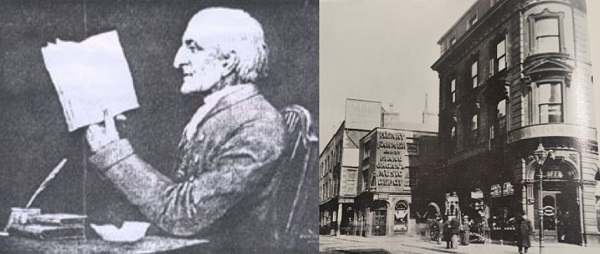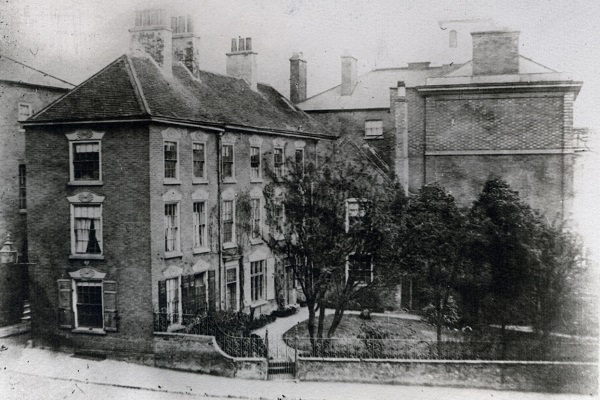Where it all began…
It all started in 1849 when a small group of Nottingham businessmen, led by local Quaker Samuel Fox, set up Nottingham Building Society. Our first ever branch opened on George Street, Nottingham. It used to open between 6pm and 9pm on the first Tuesday of each month. The vision of our founder was to help people own their own home, as well as offer them a safe and secure place for their savings. Find out more about Samuel Fox below.
Our founder – Samuel Fox
The name of our founder Samuel Fox and his legacy should remain a firm part of the city’s heritage forever due to the inspirational work he carried out during his life.
Even before setting up our mutual building society in 1849, Fox had done a tremendous amount for the people of Nottingham, not least in areas such as adult education, public health and the abolition of slavery.

Left - Nottingham Building Society's founder, Samuel Fox
Right - Location of the Fox family’s grocery store on High Street
Born into a family of devout Quakers on 24 November 1781, Fox had grounded roots as his father, William, was a grocer and mother, Mary, worked in a mill.
He was part of the Society of Friends on Spaniel Row in Nottingham but little more is known of Fox’s childhood other than he had a loving family and that his father’s profession would play a key part in his future.
Fox went on to run the grocery business, from a building that is no longer in existence on High Street in Nottingham. It was a congested thoroughfare at the height of the coaching era.
All of the grocery shop assistants were ‘teetotallers and serious-minded people’ and wore traditional Quaker dress consisting of a lavender gown, white shawl, low shoes and lavender silk bonnet.
The Quakers were the first to introduce fixed prices in their shops, so that everyone paid the same. Fox adopted this approach too - an indication of his fairness and willingness to help all.
Another sign of exactly that was his insistence that everyone should be served in order of arrival – something that infuriated a fair few wealthy folk who elsewhere were given the right to be served first.
Apparently affectionately known as Sammy, one of the projects he was best known for was his role in starting the first adult school in 1798 in partnership with a Methodist called William Singleton.
A Methodist and Quaker working together was not too common at the time, and what makes the endeavour even more remarkable is that Fox was just 18 at the time!
Initially for women from local lace and hosiery factories, the school grew to include men too, and scholars were taught how to improve their reading and writing levels.
Fox strongly knew these literacy skills enhanced their employment prospects and played a role in helping people put a roof over the heads of their families – an ethos that he would stay true to when later setting up Nottingham Building Society.
In 1842 parliamentary candidate Joseph Sturge visited the school and was impressed with what he saw. He opened a similar establishment in Birmingham in about 1845.
Twice married – his first wife, Sarah, died in 1827 aged just 40 – Fox was quite literally at the forefront of public health when there was a major cholera outbreak in Nottingham (1832).
As well as being one of only a few people in the city that would venture into infected houses he became a key player in establishing the Nottingham Board of Health, which was extremely concerned about the welfare of the city’s residents.
Sadly, 300 cases of the illness proved fatal and the city’s burial ground provision was inadequate so Fox bought and provided land for a cemetery for the working class victims to be buried in. However, his desire to help everyone affected was to hit a curious stumbling block.
Fox approved of the consecration of the burial ground by the Archbishop of Canterbury, but in doing so it unwittingly meant that only Anglicans would be able to be buried there.
A committee, of which Fox was the most prominent member, was formed and they obtained an Act of Parliament which meant part of it would not be consecrated by the Archbishop and therefore people of all denominations could be buried there.
The land, on the corner of Bath Street and St Ann’s Wells Road, is now known as St Mary’s Rest Garden. Fox also contributed generously to the General Cemetery on Derby Road, where fittingly there is a tablet to his memory.
Being compassionate wasn’t exactly seen as the norm amongst business owners in the 19th century, however Fox attended a World Anti-Slavery Convention in 1840 and went on to become one of the Secretaries of the Nottingham Anti-Slavery Society.
Fox’s passion for helping people led to the idea of forming an organisation where locals could safely save their money so it swelled into an amount big enough to buy a house. The banking system at the time was elitist and only served the upper classes with lots of money.
But even before he could get his Nottingham Building Society plans off the ground the city found itself in the throes of another health crisis, so Fox shifted his focus to supporting people as famine struck in 1847.

Fox’s former home on Hounds Gate in Nottingham
Thanks to his grocer contacts, Fox obtained stacks of maize flour, which was new to Nottingham and was a cheap substitute for other cereals. He sold it to all for less than it had cost him and in doing so saved many lives.
As with the rules of his grocery shop, people were served on a first come, first served basis, and anyone with a great sense of self-entitlement who felt they could push in was met by Fox who simply said: “thee get back and take thy place at the end else thou will get no flour”.
Nottingham Building Society came into being in 1849, when a small group of Nottingham businessmen led by Fox started trading for the first time.
Originally open between 6pm and 9pm on the first Tuesday of each month, it soon began to grow as a place for working to middle class people to safely keep their savings, with a view to owning their own homes.
Our first ever branch was located on George Street in Nottingham before a relocation to Fletcher Gate. His dedication to literacy and learning continued on through the society as he closed on Saturdays so his team members could go out to the factories to teach the unskilled workers to read and write.
In 1861 Fox, who was by then 80, retired from his position as chairman of the society. He sadly died seven years later, on 6 August 1868.
There are small but significant reminders - such as the tablet in the General Cemetery - around the city of Nottingham, but to many local people he is not a known name.
Fast forward to today and our 500+ team members regularly celebrate his story and what he achieved, as his legacy lives on in our desire to help people plan, protect and save for their futures and to own their own homes.
We are extremely proud that our society was built on a genuine purpose for the greater good of the community and our founder, our very own fantastic Mr Fox, was a man with such integrity, kindness and a passion to help others – pillars that sit firmly in our beliefs to this day.
Article information sources
Nottingham Quakers
Wikipedia
Nottinghamshire History, featuring extracts from Recollections of old Nottingham by Ann Gilbert.

